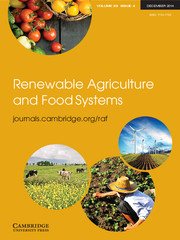Crossref Citations
This article has been cited by the following publications. This list is generated based on data provided by
Crossref.
Ahmed, Selena
Sclafani, Alexandra
Aquino, Estephanie
Kala, Shashwat
Barias, Louise
Eeg, Jaime
Kapuscinski, Anne R.
Locke, Kim A.
and
Méndez, Ernesto
2017.
Building student capacity to lead sustainability transitions in the food system through farm-based authentic research modules in sustainability sciences (FARMS).
Elementa: Science of the Anthropocene,
Vol. 5,
Issue. ,
Powell, Lisa Jordan
and
Wittman, Hannah
2018.
Farm to school in British Columbia: mobilizing food literacy for food sovereignty.
Agriculture and Human Values,
Vol. 35,
Issue. 1,
p.
193.
MacDonald, Kate
and
Breunig, Mary
2018.
Back to the Garten: Ontario kindergarteners learn and grow through schoolyard pedagogy.
Journal of Outdoor and Environmental Education,
Vol. 21,
Issue. 2,
p.
133.
Brekken, Christy
Peterson, Hikaru
King, Robert
and
Conner, David
2018.
Writing a Recipe for Teaching Sustainable Food Systems: Lessons from Three University Courses.
Sustainability,
Vol. 10,
Issue. 6,
p.
1898.
Jabbour, Randa
and
Pellissier, Makenzie E.
2019.
Instructor Priorities for Undergraduate Organic Agriculture Education.
Natural Sciences Education,
Vol. 48,
Issue. 1,
p.
190010.
Medina, F. Xavier
Pinto de Moura, Ana
Vázquez-Medina, José Antonio
Frías, Jesús
and
Aguilar, Alicia
2019.
Feeding the online: perspectives on food, nutrition and the online higher education.
International Journal of Educational Technology in Higher Education,
Vol. 16,
Issue. 1,
Bosman, Lisa
and
Eom, Sangjun
2019.
Using scaffold innovation-thinking frameworks to integrate food science and technology into the transdisciplinary engineering design classroom.
International Journal of Educational Technology in Higher Education,
Vol. 16,
Issue. 1,
Hossain, Niamat Ullah Ibne
Dayarathna, Vidanelage L.
Nagahi, Morteza
and
Jaradat, Raed
2020.
Systems Thinking: A Review and Bibliometric Analysis.
Systems,
Vol. 8,
Issue. 3,
p.
23.
Gras, David
Conger, Michael
Jenkins, Anna
and
Gras, Michael
2020.
Wicked problems, reductive tendency, and the formation of (non-)opportunity beliefs.
Journal of Business Venturing,
Vol. 35,
Issue. 3,
p.
105966.
Levkoe, Charles Z.
Knezevic, Irena
Appavoo, Donna
Moraes, Andrea
and
Scott, Steffanie
2020.
Serving up food studies online: teaching about “food from somewhere” from nowhere.
Food, Culture & Society,
Vol. 23,
Issue. 3,
p.
434.
Ebel, Roland
Ahmed, Selena
Valley, Will
Jordan, Nicholas
Grossman, Julie
Byker Shanks, Carmen
Stein, Mary
Rogers, Mary
and
Dring, Colin
2020.
Co-design of Adaptable Learning Outcomes for Sustainable Food Systems Undergraduate Education.
Frontiers in Sustainable Food Systems,
Vol. 4,
Issue. ,
Jouan, Julia
De Graeuwe, Mireille
Carof, Matthieu
Baccar, Rim
Bareille, Nathalie
Bastian, Suzanne
Brogna, Delphine
Burgio, Giovanni
Couvreur, Sébastien
Cupiał, Michał
Dumont, Benjamin
Jacquot, Anne-Lise
Magagnoli, Serena
Makulska, Joanna
Maréchal, Kevin
Pérès, Guénola
Ridier, Aude
Salou, Thibault
Tombarkiewicz, Barbara
Sgolastra, Fabio
and
Godinot, Olivier
2020.
Learning Interdisciplinarity and Systems Approaches in Agroecology: Experience with the Serious Game SEGAE.
Sustainability,
Vol. 12,
Issue. 11,
p.
4351.
Krzic, Maja
Brown, Sandra
and
Bomke, Arthur A.
2020.
Combining problem‐based learning and team‐based learning in a sustainable soil management course.
Natural Sciences Education,
Vol. 49,
Issue. 1,
De Bernardi, Paola
and
Azucar, Danny
2020.
Innovation in Food Ecosystems.
p.
135.
Heiss, Sarah
and
Daigle, Kerry
2020.
Poetic Expressions of Transdisciplinary Food Systems Collaborations.
Journal of Agriculture, Food Systems, and Community Development,
p.
1.
Valley, Will
Anderson, Molly
Blackstone, Nicole Tichenor
Sterling, Eleanor
Betley, Erin
Akabas, Sharon
Koch, Pamela
Dring, Colin
Burke, Joanne
Spiller, Karen
and
Iles, Alastair
2020.
Towards an equity competency model for sustainable food systems education programs.
Elementa: Science of the Anthropocene,
Vol. 8,
Issue. ,
Den Boer, Alanya CL
Broerse, Jacqueline EW
and
Regeer, Barbara J
2021.
The need for capacity building to accelerate food system transformation.
Current Opinion in Food Science,
Vol. 42,
Issue. ,
p.
119.
Buyana, Kareem
Walubwa, Jacqueline
Mukwaya, Paul
Lwasa, Shuaib
and
Owuor, Samuel
2021.
City residents, scientists and policy-makers: power in co-producing knowledge.
Urban Transformations,
Vol. 3,
Issue. 1,
Classens, Michael
Hardman, Emma
Henderson, Nicole
Sytsma, Emily
and
Vsetula-Sheffield, Anterra
2021.
Critical food systems education, neoliberalism, and the alternative campus tour.
Agroecology and Sustainable Food Systems,
Vol. 45,
Issue. 3,
p.
450.
Montenegro de Wit, Maywa
Shattuck, Annie
Iles, Alastair
Graddy-Lovelace, Garrett
Roman-Alcalá, Antonio
and
Chappell, M.
2021.
Operating principles for collective scholar-activism: Early insights from the Agroecology Research-Action Collective.
Journal of Agriculture, Food Systems, and Community Development,
p.
1.




